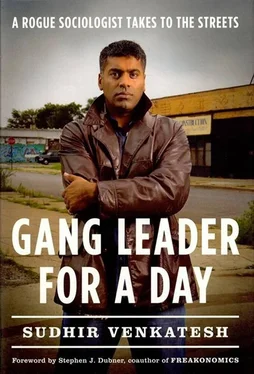“So you’ll be my research assistant!” I said with a laugh, not quite sure what he was proposing.
“No, no! You’ll still be writing about me. The book will still be about me, but this will add a new dimension to it.”
“Yes, it would add a lot, but I’d really have to check with my professors. I mean, I’m not sure what’s going to happen once I move…”
J.T.’s voice immediately took on a guarded tone. “No, I understand,” he said. “I know you got a lot to think about. I’m just saying that I could help you. But yeah, you talk to your professors first. No big thing…”
We sat there, not speaking, eyes on the TV. I kept hoping we’d be interrupted by Ms. Mae calling us for dinner, but we weren’t. I didn’t even have the energy to muster up a question about J.T.’s business or his life, as I’d always done previously whenever he sensed that my interests were shifting. Finally a college basketball game came on, and the blare of the crowd and the cheerleaders drowned out the silence between us.
With the demolition of Robert Taylor now formally scheduled to begin within a year, the drug economy in J.T.’s buildings was already faltering. Some of his best customers were tenants, and they were starting to move out. So were a lot of the BK foot soldiers who still lived at home with their moms. (J.T. offered to rent Ms. Mae a home in one of several neighborhoods, and she tried out a few, but she wound up coming back to a cousin’s house a few hundred yards from Robert Taylor.) The whole place had also grown thick with police, called in to protect the streams of contractors, engineers, city planners, and other bureaucrats who were plotting the massive demolition.
With less demand for drugs, there was less work for J.T.’s rank-and-filemembers. It was in his interest to place these young men in a new gang, since he never knew when he might need their help in the future. Given his standing in the BKs, it was certainly within J.T.’s power to reassign his foot soldiers to other BK factions throughout the city. But he was able to place only a handful at a time, and no more than a few dozen overall. Worse yet, this strategy tended to fail in the long term, since in most cases the host gang wouldn’t fully accept the new member.
J.T.’s gang also had a lot of older members, in their thirties and even forties, who were unwilling to accept a transfer, since that typically meant a drop in seniority and, accordingly, income. Some of these men began to leave J.T.’s command altogether, trying to secure positions within other gangs around the city-occasionally, to J.T.’s deep displeasure, within a rival gang.
A few of J.T.’s men traveled as far as Iowa to try to set up shop. I never went along on any of these out-of-state recruiting trips, but judging from the frustration of the BK missionaries who returned to Chicago, this plan wasn’t going to work out very well.
J.T. tried to hold things together, but the new economics of his situation conspired against him. He grew lonely, feeling as if he were being abandoned by his own BK family. His sense of paranoia grew even more acute. Whenever I saw him, he immediately began to speculate that the more senior BK defectors were revealing the gang’s secrets to rival outfits: where the BKs stored guns and drugs, which cops were open to bribery, which local merchants were willing to launder money.
And then there were the arrests. The federal indictments that had begun to tear apart other gangs were now striking the Black Kings as well. Barry and Otis, two of J.T.’s younger members, had recently been arrested. I wondered how long J.T. would be able to stay free himself. One night, driving back from one of the suburban gang meetings, he mused that jail might actually be the best of his options, since anyone who escaped arrest for too long was suspected of being a snitch and placed himself in real danger on the streets.
Soon after this conversation, I heard that T-Bone had been arrested. He was eventually convicted of trafficking narcotics and sentenced to more than ten years in prison. His prompt transfer to an out-of-state prison fueled speculation that he was testifying against his peers to get a reduced sentence. I tried every avenue I could think of, but I had no luck reaching T-Bone. I eventually heard that he had died in prison, and he became celebrated in death for never having cooperated with the police to sell out other gang members.
For a time I thought that J.T. and I might remain close even as our worlds were growing apart. “Don’t worry,” I told him, “I’ll be coming back all the time.” But the deeper I got into my Harvard fellowship, the more time passed between my visits to Chicago, and the more time passed between visits, the more awkward J.T. and I found it to carry on our conversations. He seemed to have grown nostalgic for our early days together, even a bit clingy. I realized that he had come to rely on my presence; he liked the attention and the validation.
I, meanwhile, grew evasive and withdrawn-in large part out of guilt. Within just a few months at Harvard, I began making a name for myself in academia by talking about the inner workings of street gangs. While I hoped to contribute to the national discussion on poverty, I was not so foolish as to believe that my research would specifically benefit J.T. or the tenant families from whom I’d learned so much.
As demolition became a reality, and as J.T.’s gang continued to fall apart, so did our relationship. When I told him that I’d been offered a job teaching sociology at Columbia University upon completing my Harvard fellowship, he asked me what was wrong with teaching in Chicago. “What about high school?” he said. “Those people need education, too, don’t they?”
The breakdown of the gang affected Ms. Bailey as well. When the gang didn’t make money, Ms. Bailey didn’t make much money either. And with demolition so near, she needed all the money she could get to help the tenants she wanted to help. She paid for day care so single mothers could go look for new apartments. She hired a car service to take tenants on their housing searches. She helped others settle their outstanding electricity bills so they’d be able to get service once they entered the private market.
But as the money ran out, some tenants began to turn on her. Even though the CHA was supposed to provide relocation services, it was Ms. Bailey who had stepped into the breach, for a fee, and so she was the one who now caught the blame. She was widely accused of pocketing the gang’s money instead of using it for the tenants.
I had never seen Ms. Bailey cry until the moment she told me about these accusations. “I have lived here for almost my whole life, Sudhir,” she said mournfully.
We were sitting in her office on a hot spring day. The old bustle was long gone. It used to be that we couldn’t sit and talk for ten minutes before Ms. Bailey was interrupted by a needy tenant; now we had the room to ourselves for well over an hour.
“You’ve been told before that you work too closely with the gangs,” I said. “Why does it bother you now?”
“Out there they don’t have anybody,” she said. “Out there they think they can make it on their own, but…” She tried and tried, but she wasn’t able to finish her sentence.
I wanted to say something worthwhile but couldn’t think of anything. “They’ll… they’ll be okay,” I sputtered. “Hell, they lived through the projects.”
“But you see, Sudhir, I know that and you know that, but they sometimes forget. It’s like I told you many times: What scares you ain’t what scares them. When they go to a new store or they have to stand at a bus stop in a place they never been to before, that’s what scares them. I wanted to help them feel okay. And just when they need me, I can’t be there for them.”
Читать дальше












